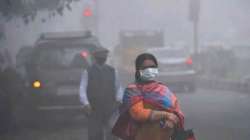6 precautions to take when dealing with smog this year
Delhi-NCR's air quality has slipped to hazardous levels which can result in severe health problems like breathlessness, nausea, burning sensation in the eyes and more. Follow these tips when dealing with smog and air pollution.

The levels of air pollution during Diwali this year were found much higher as compared to the last year while a significant dip was found in noise pollution level, the Central Pollution Control Board (CPCB) revealed on Sunday. In a special report, the CPCB said almost all pollutants reported higher values on Diwali day and pre-Diwali day this year as compared to 2019.
When the fog is mixed with pollutants to form 'smog' that it becomes dangerous for your health and the main reason for the formation of smog is the increasing air pollution. Air pollutants from cars and Diwali crackers like sulphur dioxide, nitrogen dioxide and various industrial pollutants like carbon monoxide, volatile organic compounds, ozone and particulate matter mix with fog to form a dense layer in the atmosphere called smog.
This smog may lead to severe health conditions including lung diseases, breathlessness, nausea and even cancer. Therefore, it is very important for you to take preventive measures. Follow these few tips when you are dealing with smog and air pollution.
Avoid stepping out
Not just air pollution but even due to the global COVID-19 pandemic, everyone is recommended to stay indoors and only step out when necessary.
Avoid taxing physical activity
Physical activity in polluted air can be harmful. Therefore avoid running or doing any intense workout out in the open.
Wear masks while stepping out
don't forget to cover your nose and mouth without a mask before stepping out. It will keep you safe from the toxic air pollutants as well as the COVID infection.
Keep drinking lots and lots of water
Hydration is also extremely important in such situations since water flushes out the toxins out of body.
Have air purifiers at home
Consider investing in air purifiers at home. These will flush out the harmful air pollutants out and will filter in the clear air inside your home.
Consider home remedies
Herbal preparations like Triphala Powder, Pippali Powder mixed with Ginger and Turmeric powder along with honey and warm water is very helpful in preventing the damaging effects of smog.
With inputs from IANS.